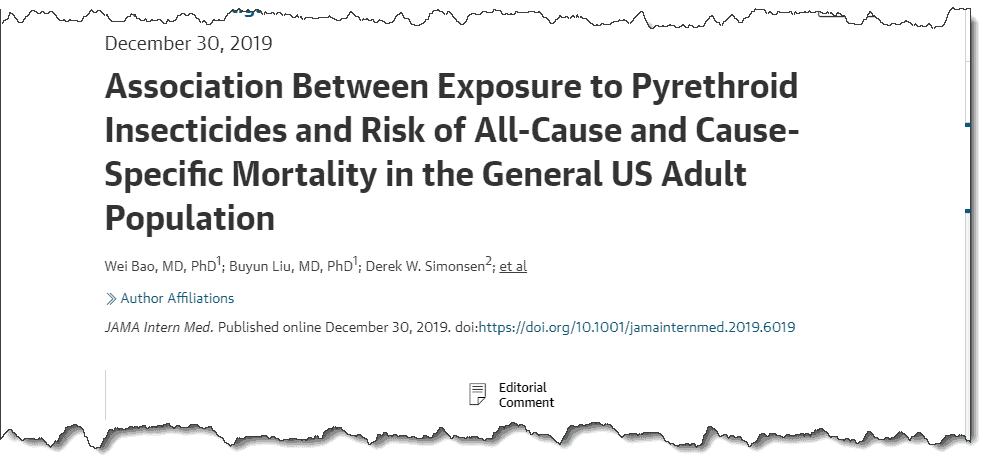
These pesticides are in lots of foods and end up in the male body — and they’re linked to heart problems and higher death rates in men…
—-Important Message—-
Testosterone makes men live longer — here’s how to naturally boost your T
One bite of this naturally raises my testosterone…
I just pop it in my mouth and feel the surge of energy that comes with having high T.
Having high testosterone will make your muscles stronger, boost your drive and stamina, and give you an extra “oomph” when working out or getting busy in bed.
And scientists found that men with higher natural testosterone live longer than men with low testosterone:

So raising testosterone is the best thing you can do as a man.
———-
Pyrethroid pesticides — found in men’s urine
I heard a character on TV the other day saying that “poison is the murder weapon of women.”
I don’t know if that’s true or not, but poison certainly is the murder weapon of Big Agriculture.
They use poison to kill bugs and diseases on crops. And these poisons are supposed to be safe for humans.
But, while they don’t kill people right away, that doesn’t mean they are safe.
Some of the chemicals that are sprayed on our food and used on our pets are now being linked to death from heart failure.

We’re talking about pyrethroid pesticides.
What are pyrethroid pesticides?
Pesticides are important to modern agriculture…
They allow farmers to produce higher yields of crops because the pesticides kill the bugs that would eat the crops.
But are chemicals that kill bugs really safe for humans?
Many people think that if it doesn’t poison them immediately, then a substance is safe.
But recent studies have shown that a certain class of insecticides – pyrethroid pesticides – is probably not as safe as we thought.
“Pyrethroid pesticides are a large family of synthetic analogues of naturally occurring pyrethrins widely used for insect control in agricultural and numerous consumer products. Collectively, they are the second-most-used insecticides in the world, totaling thousands of kilograms and billions of dollars in US sales.”
These pyrethroid pesticides are incredibly common and can be found in many applications.
Pyrethroid pesticides are probably in your home.
Over 3,500 registered products contain this type of pesticide.
They are on our food supply. And they are used to control mosquitoes, pests on pets, among other things.
“Pyrethrins and pyrethroids are insecticides included in over 3,500 registered products, many of which are used widely in and around households, including on pets and in treated clothing, in mosquito control, and in agriculture.”
And the use of these chemicals is growing. That means there are more and more of them in your day-to-day life.
“The use of pyrethrins and pyrethroids has increased during the past decade with the declining use of organophosphate pesticides, which are more acutely toxic to birds and mammals than the pyrethroids.”
The BIG problem with chemicals like this is that the negative effects on the human body don’t often show up until months and years later.
So, people may not KNOW how bad these chemicals are for them until it’s too late.
Pyrethroid pesticides are linked to higher rates of death from heart problems.
It does appear that the pyrethroid class of pesticides is safer than the organophosphate types that they are replacing.
Unfortunately, that doesn’t mean these chemicals are SAFE.
“The researchers followed the participants for up to 16.8 years after urinary measurement of 3-phenoxybenzoic acid (3-PBA), a metabolite of pyrethroid exposure. They reported significant hazard ratios of 1.56 for death from any cause and 3.00 for death from cardiovascular disease for individuals in the highest compared with the lowest biomarker exposure tertile.”
In a recent study, people with the most of these types of chemicals in their bodies (according to urine tests) had up to a three times higher rate of dying from heart disease than people with the lowest amounts.
That is a HUGE risk increase over time.
And, because this type of pesticide is so common, it can be hard to avoid.
Avoiding pyrethroid pesticides
For most people, their greatest exposure to pyrethroid pesticides is in their food intake – particularly in what is called the “dirty dozen.”
These are the foods with the highest level of residual pesticides still on them once they hit your table.
The Dirty Dozen:
- Strawberries
- Spinach
- Kale
- Nectarines
- Apples
- Grapes
- Peaches
- Cherries
- Pears
- Tomatoes
- Celery
- Potatoes
If you can get these foods as organics so that they don’t have pesticides, that will reduce your exposure.
Another method is to soak them in a solution of baking soda and water then rinse off.
You aren’t going to be able to get your exposure to pyrethroid pesticides to zero, but you can reduce it – and it’s probably a good idea to try.
—-Important Message—-
Food Warning to Men: I found this additive in virtually all foods

For the first time ever, I’m blowing the lid of this well kept secret…
…how virtually every food is intentionally and knowingly contaminated with a toxic chemical that radically increases cancer…heart disease…even performance problems…
You won’t find this ingredient listed on the label unless you know where to look and how to read the label…
…it’s the most dangerous additive and you should avoid ANY food that has it…
I made this video to show you how to find the additive on the label, and what foods to avoid…
———-
